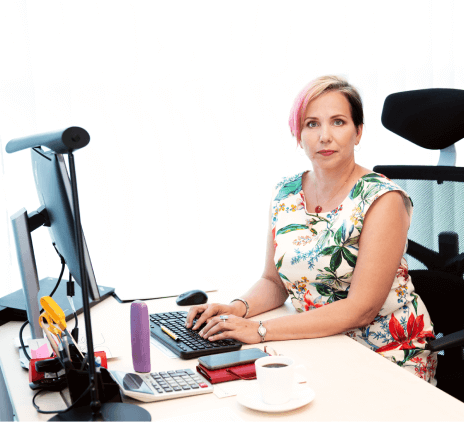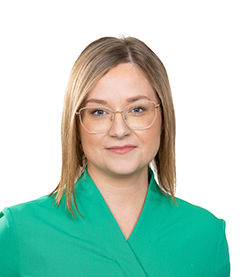This year we have again reason to eat birthday cake: It is the 15th anniversary of the opening of Grant Thornton Baltic’s Tartu office. But time has moved on and a new question has now come up, and that is, whether the existence of a physical office is important at all in the age of email and cloud services? ![Grant-Thornton-Baltic-Raili-Ilves-Tartu 464x422px.png]()
Our client relations manager and financial adviser Raili Ilves says it’s very important. “Regardless of Skype, the option of digital signing and conference calls, clients place a great deal of value on face-to-face meetings. Yes, business would also get done using technological means, but human contact would disappear. For this reason, many of our clients find time to personally meet because this way is much better to communicate and discuss matters,” says Raili.
Does conversation during meetings with clients sometimes bring up topics that no one had thought of earlier and which lead to additional cooperation?
It does indeed. Recently I had a case where I met an accounting client to renew a contract. I could’ve done that by email as well but I decided to meet in person. In the course of the conversation, it turned out that they had a very large project ahead of them this year and we could help them with that. So coincidences and seizing the initiative have a great role in customer relations.
In Tartu, we’ve taken the direction of meeting clients face-to-face at least once a year, because much can change over that time. What might not be a point of concern now could turn into a headache a year later. Our advisors are able to head off such situations to keep the headache from coming up. This is why we are very glad to welcome clients to our Tartu office, but we are also very glad to meet clients at their office, because it’s interesting to see on the spot what is being done in the client’s company and how.
Speaking of changes, it’s no doubt obvious that companies now have different needs compared to 10 to 15 years ago. What do businesses require today?
One such topic for example is the IT world and related risks. When we talk to clients, it becomes increasingly clear that besides conventional accounting and payroll, they need advisory services. Most of all, they need tax advice, such as on the topic of fringe benefits, or on tax issues such as value added tax, which crop up when they are expanding to markets abroad. In second place, they’re interested in work procedures and employment contracts, because legislation often changes in this field. Topics related to the employees are of course very important for all companies. They ask how to be an attractive employer, how to effectively run recruitment and how to keep and motivate existing employees. They’re even interested in how to build a functioning management structure – what should be the compensation packages, how to support employees in their everyday work, etc. One cannot get around risk management either – known popularly as data protection and internal audits, but actually the topics involved in risk management are much broader.
It’s also important that the people who founded companies in the 1990s now want to start living more laid-back life and they’re looking for possibilities of selling off their companies. On the other hand, others are looking to snap up a competitor in order to grow. Providing advisory services for acquisitions and sales, preparing such transactions, valuating companies – all these topics are currently very salient.
Grant Thornton’s Tallinn office has 77 employees, while around 10 work in Tartu. Does this mean that not all of Grant Thornton’s services are available for businesses in southern Estonia?
No, southern Estonian businesses do not miss out on anything. Accounting, risk management, finance, tax and legal advisory and much more are always available at Grant Thornton. Grant Thornton’s principle is to assemble the team based on client’s needs, regardless of whether the client is based in Tallinn, Tartu or Võru. So if our Tartu office lacks some necessary specialist, the work won’t go undone — we will work closely with our colleagues in Tallinn. Our Tartu team’s group leaders Kaisa Kure and Deiwi Aru help to assemble appropriate teams, and also shoulder the planning and management of work. In the sense of organisation of work, it is also important that several people at Grant Thornton work with each client to prevent a situation where our accountant falls ill or goes on vacation and work with that client’s company would come to a standstill. 
Our clients include both smaller local companies and companies that have established a foothold in the Nordics and more distant markets. For instance, one of our long-term clients is the Estonian capital based family business OptiPRO, which owns a chain of Pro Optica stores operating in all parts of Estonia. We also work with the public sector: the Ahhaa Science Centre is a good example of this.
Often Estonian new businesses do so much business in foreign countries that they are required by law to register their commercial activity in the foreign country and all administration including payment of taxes is performed according to the local rules. In this case, too, we can provide advisory services to companies because Grant Thornton has cooperation partners in more than 130 countries. A good example of our southern Estonian clients’ cross-border activity is the agricultural enterprise Baltic Vianco, which has subsidiaries in Latvia and Lithuania.
You’ve been actively organising seminars for clients recently and word is that they have been popular. Why is that?
That’s true– we are actively holding seminars in both Tartu and Tallinn. We always choose salient topics and we keep the number of participants quite low so that there is a possibility for asking questions and exchanging experiences directly with other participants. Our seminar room in our office in Tartu accommodates 10-12 people but if necessary we can hire a larger room in the same building. The Tallinn office’s seminar room holds up to 40 people which is actually quite a lot.
In late winter this year, we had a standing-room-only audience for data protection and labour law seminars. Undoubtedly our leading legal advisor Kristel Tiits plays a role here – she’s a highly valued presenter on topics of labour law, and we also owe a debt to our data protection specialist Maili Torma, who is extremely well versed in data protection topics.
It’s possible to order in-house trainings for companies from us— we provide these trainings primarily in the fields of the data protection, labour law and taxes.
Last question – a personal one. You came to Grant Thornton less than a year ago – what was it that appealed to you here?
I was impressed by the fact that the selection of services offered by Grant Thornton was so broad that you couldn’t find a client who wouldn’t benefit in some way from our offerings. We’re able to provide the services needed by any company at any stage in the life-cycle – whether they’re just starting out, rapidly growing, or mature. Our clients’ profile attests to this.
Having worked for Grant Thornton for some time now, I can say that what I like in my work are more complicated negotiations where we have to compete with other service providers. This “forces” me to marshal good arguments and highlight the places where we generate value for the client, and if the client does decide to opt for our services, it’s very rewarding. Admittedly it does help that I probably have a little bit assertiveness than some.
What’s also interesting is that even though I have contact with many different kinds of companies in my work, they all face pretty much the same problem areas no matter what their size or area of activity. It’s solutions to these problems that my team and I offer. Our team is certainly one of the reasons why I am always cheerful when I come to work – in Tartu we have a very cohesive team like a big family. Everybody knows everybody and we get along great at work and after work.






